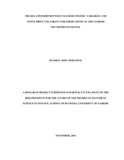| dc.description.abstract | Arising market problems may be related to huge fluctuations in macroeconomic fundamentals and asset prices. Stock price volatility refers to average rate at which the price of a security fluctuates or simple it‟s the variation in stock price. The major factors that influence the prices of a share are; interest rate changes, money supply, inflation, political environment, legislative amendments. There are competing views on the interplay between stock market and the macro economy. The Nairobi Securities Exchange (NSE) has seen drastic volatility in share prices. The study looked at the effect of macroeconomic variables on stock price volatility for firms listed at the Nairobi Securities Exchange. Literature review was gathered from various sources with more emphasis on more current literature from renowned authors in stock prices/ price volatility. The study adopted a causal research design. The study used a five year (2011 to 2015) secondary data obtained from NSE, Kenya National Bureau of statistics (KNBS) and the Central Bank of Kenya (CBK) using the data collection template. A multiple linear regression model was applied since it was the most suitable econometric model that describes and evaluates the relationship between stock price volatility and one or more macroeconomic variables. Diagnostic tests were conducted on the data collected to determine if they were suitable for multiple linear regressions. The study used the regression coefficients to test the magnitude of the stock sensitivity to macroeconomic variables. Also, the study used correlation, ANOVA and coefficient of determination (R2) to determine the models significance. Data analyzed was presented through frequency distribution tables and figures and in prose form for easy understanding. From the findings the study concluded there are weak positive associations between stock price volatility and broad money, exports rates and exchange rates. Stock price volatility has statistically significant weak negative associations with interest rates. Also, the study concluded that broad money negatively influences stock price volatility, interest rates negatively influences stock price volatility, exchange rates positively influences stock price volatility and export earnings positively influences stock price volatility. The study concluded that a two month lagged exchange rates causes‟ stock price volatility, export earnings and interest rates while two month lagged interest rates causes‟ exchange rates. The study recommended that the government of Kenya should try to reduce the variable fluctuations that is; seek to minimize fluctuations on the variables; broad money, interest rates, export earnings and exchange rates. Further the study recommended that NSE should put in to place practices/strategies that will enable control of macroeconomic variables in order to moderate the stock price volatility. Also, Local researchers and academicians should increasingly study the macroeconomic variables that influence stock price volatility to add on to the limited literature in Kenya. | en_US |



